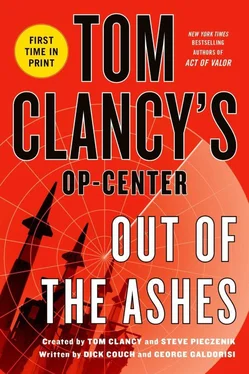“Will there be anything else, Commander?” Smith asked as his eyes narrowed. Kennedy was not making this easy on him, nor had he expected him to.
“No, sir, Admiral, only that I’d be proud to have Lieutenant Barron keep flying with the Swampfoxes.”
“I respect that feat of airmanship, Skipper, as well as your inventory of Lieutenant Barron’s fine qualities. However, the fact remains, she would not have been shot down if she hadn’t broken every rule in the book. Furthermore, she violated the trust of her nation and her Navy in doing so.” Then he spoke directly to Barron. “Lieutenant, regardless of how any legal proceedings turn out, you’re done flying in this admiral’s Navy. I take no pleasure in this, but I want you to remove your wings from your uniform and hand them to your skipper.”
Sandee hadn’t expected this to turn out well, but the admiral’s final pronouncement made it reality. I can fly that helo and the box it came in — I know it, the skipper knows it, and I’ll just bet the admiral knows it — but if he says I’m done, I’m done. Her hands were shaking as she reached inside her blue coat and pulled the two backings that held her wings to her uniform. With that done, she handed her wings to Kennedy.
Smith reached across the podium, his palm up. “Give them to me, skipper.” Kennedy did as he was told.
“Now, I’d advise you to exercise a bit more leadership in your squadron so your pilots don’t pull any dumb-ass stunts like this again. Next time, I’ll have your wings as well.” Smith looked from Kennedy to Barron and back. He was in pain, and both pilots knew it. “I want you both to get out of my office.”
Kennedy and Barron left Smith’s office and stood in the long hallway outside the command spaces. Sandee’s emotions ran from rage to disappointment to disillusionment to frustration — and sadness. She truly loved flying and she loved military aviation. Now it was gone. Above all, she had let people down including her squadron mates and her commanding officer.
“Skipper, I am so sorry. I don’t know why I didn’t think this through better. I let you down and now your career is on the line.” She bowed her head. “I wish to hell I had this to do all over again. If I did, I wouldn’t have let you down.”
“You stopped a war, Sandee, and no one can take that away from you. I’d fly with you any day, and you can take that to the bank.”
“Thank you, skipper.” On an impulse, she hugged him, something she had never done with any male in uniform — until now. Now she had to go home and tell her husband and her girls her career was over. Once that was done, she had one more call to make.
* * *
Ilya Gorbonov had been in the extended-stay hotel for almost a month, and he was getting tired of it. He couldn’t let the maids clean his room because they might get curious and open one of the fake boxes of costume jewelry and discover the sarin gas and explosive timers he had rigged for delivery to his carts.
Gorbonov wasn’t a neat man, not by a long shot, and now he was living in complete squalor with the stench of old pizza, beer, and dirty laundry permeating the room. He wanted his payday. He desperately wanted to get back to Tennessee so he could spend time with the woman who serviced him. He paid her well, and now he would be able to keep that up for a long time.
They weren’t telling him anything, other than he was not to communicate with them. To hell with that! He typed an angry e-mail to his Lebanese contact in Ali Hosseini Khamenei’s employ demanding to know when he would be given the go-ahead to execute his mission.
* * *
When Sandee Barron had called Laurie Phillips at home the evening after her dressing-down by Admiral Smith it was a difficult conversation for both of them. They had briefly discussed career options for Sandee, who had already decided she’d not stay in the Navy if she couldn’t fly. Laurie had offered to help her with a job search in the Washington, D.C., area. Sandee and her husband currently made their home in Mayport, Florida, an area with limited job prospects for her. Sandee’s husband was a consultant with KPMG, and he enjoyed good career mobility. They agreed to talk again soon and to meet in D.C. as soon as feasible to discuss career possibilities.
What Laurie didn’t tell Sandee as she reviewed her career options with her was that she, too, was making a career move. She would tell her later, when the time was right. For Laurie, there was no formal hearing in front of a senior person or anything like it. She had come into work three days ago and found a sealed white envelope with her name typed on the front on her desk. She had opened it and found a short letter on Center for Naval Analyses letterhead:
Ms. Laurie Phillips:
I regret to inform you that, due to your actions aboard USS Normandy while in our employ we have decided to terminate your service with the Center for Naval Analyses. Your actions, while they may have been well intended, contravened Navy rules and regulations.
Given the Center’s long and fruitful association with the United States Navy, we can no longer have you in our employ. Out of consideration of your previous service in the United States Marine Corps, and in deference to the injuries you have sustained, we will give you two weeks to turn over your assignments to your immediate supervisor. Additionally, you will be entitled to two months’ severance.
(signed)
Malinda Duffy,
President
Center for Naval Analyses
It was cold, final, but not totally unexpected. She read the letter quickly, only once, folded it, and put in her desk drawer. Then she quietly left the office. She’d return after working hours for her personal things. Her ongoing work would fit into a single file box, which she would leave on the desk.
* * *
The mood was considerably better at Op-Center. Duncan Sutherland had worked his usual magic getting Volner, his team, and all their equipment back to the United States. Following the debriefings, Chase Williams had told his JSOC team to take some well-deserved time off.
Williams believed that victories should be celebrated, so he had reserved the National Geospatial-Intelligence Agency’s atrium cafeteria for a quiet, late-afternoon celebration. He and Anne Sullivan served as bartenders while the caterer they had engaged served heavy hors d’oeuvres. Both Williams and Sullivan looked on their staff with a mixture of pride and ownership. After everyone had wine, a beer, or a cocktail — Sullivan prided herself on her killer mojitos, heavy on the rum — Williams released Sullivan from her duties to mingle with the others, something she rarely did. Aaron Bleich and some of his Geek Tank misfits, as they called themselves, were becoming uncharacteristically gregarious. He didn’t want to break this up with a long speech, but he wanted to say something to capture the moment and celebrate their first major success.
“Ladies and gentlemen,” Brian Dawson boomed. “Gather around, would you? The boss wants to have a word.” There was almost instant silence as the staff queued up in front of the bar and Chase Williams walked in front of it.
“You all have made me enormously proud, and more importantly, you have taken an important step in knowing how critically dependent we all are on each other. You’ve shown me, and this administration, how you can bring your diverse talents together in a common effort. We’ve accomplished a great deal in a short time, and I’m proud to serve with each and every one of you.”
The senior staff knew Williams was a big fan of the writer Daniel Pink; in fact, he had given his department heads a copy of Pink’s book A Whole New Mind as Christmas gifts. So they anticipated what he would say next.
Читать дальше












